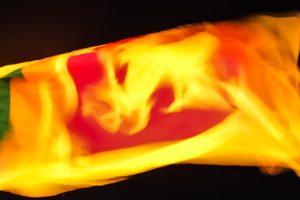As armored vehicles rolled through Myanmar’s capital early February, thousands of miles away, in another Asian state led by fervent Buddhist nationalists and under increasing militarization, a different army accused of genocide also marched troops through the streets. Sri Lanka’s former defense secretary turned president, Gotabaya Rajapaksa, was overseeing an oversized military parade on the occasion of the country’s 73rd Independence Day, on February 4, through the island’s capital, in an ostentatious celebration that reflected his own brand of militarized ethno-religious rule.
The parallels between recent events in both states, which have each seen their own democratic setbacks, illustrate how fragile transitions can be and the perils of prematurely embracing supposedly reformed regimes. Without meaningful institutional shifts, particularly in tackling ethnic chauvinism and dismantling militarization of the state, any semblance of progress can rapidly collapse. Indeed, in a world where authoritarianism around the globe is on the rise, there are hard lessons to be learnt for the international community.
In Myanmar, the beginning of that much feted transition to democracy started around 2011. National League for Democracy (NLD) leader Aung San Suu Kyi was released from decades of detention and the country’s ruling military junta began signaling a transition toward more democratic rule. Sanctions were soon eased, with Myanmar’s former general-turned-president even invited to the Obama White House. Following a 2015 electoral victory for the NLD, American and European embargoes were largely lifted, with loans and foreign investment beginning to flow into the country, despite the armed forces retaining significant control of the state.
Sri Lanka meanwhile was also being hailed for its own supposed transition in 2015. In an unexpected turn, then President Mahinda Rajapaksa, who oversaw an offensive that slaughtered tens of thousands of ethnic Tamils, lost presidential elections. A newly formed government made a wide range of promises on democracy, human rights and accountability. Similar to Myanmar, the new administration was widely embraced by the international community, with then U.S. Ambassador to the United Nations Samantha Power even calling the state a “global champion of human rights.”
But tensions in both countries remained fraught. In Myanmar, as conflicts brewed between both its military and civilian rulers, as well as its numerous ethnic groups, the armed forces launched a genocidal campaign against Rohingya Muslims. Though condemned internationally for the atrocities for which Myanmar is now before the International Court of Justice, domestically Suu Kyi rode a wave of Burmese Buddhist nationalism. Whilst Rohingya were either massacred or driven out of the country, a competition of ethnic outbidding between the NLD and the military ensued amidst an ongoing power struggle. As Suu Kyi also repeatedly attempted to chip away at the junta’s role in government, relations continued to sour and this month the military decided it would tolerate no more, launching a full-scale coup.
In Sri Lanka, despite the so-called transition, deep-rooted shifts never manifested and ethnic supremacism remained unchallenged. Whereas in Myanmar, both Suu Kyi and the military outcompeted each other for anti-Rohingya sentiment, in Sri Lanka, opposition and government leaders sought to outbid the other’s’ Sinhala-Buddhist credentials, pledging to protect Buddhism’s “foremost” place on the island and vowing to protect Sri Lankan soldiers from prosecution for war crimes. The government sought to sweep Sri Lanka’s own genocide under the rug. Meanwhile extremist Sinhala Buddhist preachers continued to espouse hate speech, sparking deadly anti-Muslim riots in 2018.
By 2019, Sri Lanka’s ruling “Good Governance” coalition had broken apart. The Rajapaksas, led by Mahinda’s younger and more hardline brother, Gotabaya, surged into power, having fervently promoted their ethno-nationalist brand in opposition. They swept local, presidential and parliamentary polls. Once in office, Gotabaya Rajapaksa immediately began cracking down on journalists and human rights defenders, and scrapped constitutional amendments limiting his powers. The once hailed transition had jolted backwards.
Given the obvious parallels, the events in Myanmar this month should act as a warning and call for concerted international action to do more to prevent another recurrence of militarized violence in Sri Lanka.
Now, like in Myanmar, the Sri Lankan president has given troops an unprecedented role in civilian life. During his previous tenure, Rajapaksa claimed to have tripled the size of the military to almost 300,000-strong, making its occupation of the Tamil northeast one of the most heavily militarized regions in the world. Since taking office, the ministry of defense has swallowed up various government institutions including telecommunications, NGO oversight, and immigration. “I am a Sinhala Buddhist leader and I will never hesitate to state so,” Rajapaksa declared at the February 3 military parade. To his right stood Shavendra Silva, the army chief who is currently barred from entry into the United States due to his involvement in war crimes, yet also heads the country’s COVID Task Force. “Sri Lanka’s new president is putting soldiers in charge of everything,” declared an Economist headline last year.
States around the world are currently scrambling to react to the complete breakdown of the rule of law in Myanmar, but the writing is on the wall that the same is due to happen in Sri Lanka if the situation goes unchecked. The markers are there — acceleration of deep militarization, intensified majoritarianism and erosion of democratic checks and balances. As the U.N. human rights chief warned last month on Sri Lanka, “the seeds of future violence and conflict” have been sown.
Dr Thusiyan Nandakumar is an editor at the Tamil Guardian, a newspaper that has been covering Tamil and Sri Lankan affairs for over 20 years.

































